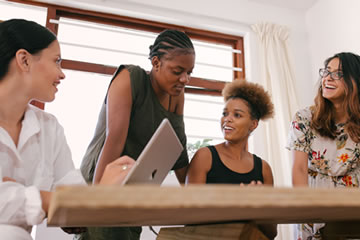What Does Allyship Really Mean?
By Janelle Gordon
Marketing Production Manager, Comic Relief US
 Allyship has become part of this nation’s continuing conversation about racial injustice and privilege in our communities and offices (virtual or in-person). To be clear, being an ally is not posting famous quotes from Martin Luther King Jr. It’s not using trending hashtags on social media. It’s much more.
Allyship has become part of this nation’s continuing conversation about racial injustice and privilege in our communities and offices (virtual or in-person). To be clear, being an ally is not posting famous quotes from Martin Luther King Jr. It’s not using trending hashtags on social media. It’s much more.
The Rochester Racial Justice Toolkit defines allyship as a proactive, ongoing process during which “a person of privilege works in solidarity and partnership with a marginalized group of people to help take down the systems that challenge that group’s basic rights, equal access, and ability to thrive in our society.” Allies take effective action, go beyond the surface and remain committed months after the headlines change.
In her Guide to Allyship, Amélie Lamont offers a reference for anyone who wants to learn more about being an ally. Here are three steps that you can take right now.
Learn
According to Lamont, it’s important to research the history of the struggle that you would like to participate in. It’s not the responsibility of any member of the marginalized group to teach you. Today, we all have access to books, articles and lectures with a wealth of historical information. There are documentaries like Ava DuVernay’s 13th that addresses the history of the criminalization of Black people or Hello, Privilege. It’s Me, Chelsea that includes a discussion about racial bias with comics Chelsea Handler, Tiffany Haddish and Kevin Hart.
Listen
Lamont advises readers to learn how to listen and accept criticism with grace. Discussions about many manifestations of racism in the workplace can be uncomfortable. Oftentimes there are more subtle forms of racism referred to as microaggressions that occur in offices. It could be asking to touch the hair of a woman of color. Even though braids and various natural hairstyles are becoming more commonplace in offices, the question—or worse touching before hearing the response — is an invasion of personal space. People of African descent have a history of being placed on display in America and the question is inappropriate. Although the comment may not be a racial slur, it could still be offensive. If you are told that a comment is offensive, the response is to listen to understand, not to react.
Amplify
Lamont encourages those who want to be allies to use their privilege to amplify (digitally and in-person) historically suppressed voices. This summer, Bozoma Saint John, Luvvie Ajayi Jones, Glennon Doyle and Stacey Bendet launched their #ShareTheMicNow campaign in honor of the Black Lives Matter movement. For this initiative, 46 Black women took over the Instagram accounts of 46 white women with a large following to amplify their stories. It was a great initiative, but there are also simple ways to amplify voices. Publicly acknowledging the contributions of a member of the marginalized group, sharing their posts with your LinkedIn network and proactively including them in conversations are examples of amplification.
The bottom line is that allyship is not easy or quick. It requires a willingness to step out of comfort zones. It might not be for everyone. However, choosing to take real, effective action is the path to progress.






